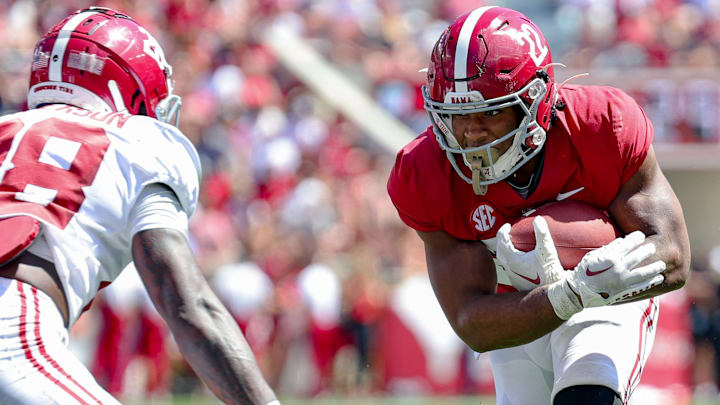Alabama Football senior LB Justin Jefferson was ejected in the fourth quarter of Alabama's 42-16 win over USF on Saturday night, and now will have to sit out the first-half of the Crimson Tide's trip to Camp Randall next week against Wisconsin.
In an era where rules of the game continue to shift further and further to the offensive side of the ball, college football officials have completely lost the plot of the spirit of the targeting rule. The targeting penalty was put into place in college football in 2008, and has been controversial from its inception.
Nobody - from the rule experts that govern the game to the armchair quarterbacks squinting their eyes at the TV in between sips of Coors Light - can agree on what targeting actually is. It has long been an inconsistent call that never seems to be interpreted the same way from one game to the next.
The spirit of the rule is to protect the players. It's to protect players from opposing players using the crown of their helmet as a weapon. In large part, the rule has been successful as we see a lot less head-first contact from players, and a lot less devastating hits that have ruined the careers and caused lifelong issues for numerous former players.
The spirit of the rule, however, is NOT to make it impossible for defensive players to do their jobs. Every college football game I watch seems to come with a controversial targeting call. Playing defense has never been more difficult in the history of the sport, and now it almost feels like they have to do so with their hands tied behind their back.
Jefferson, who was having arguably his best game in Crimson, was called for the targeting foul in the fourth quarter of an 8-point game. He came up and made a great play to tackle USF QB Byrum Brown behind the line-of-scrimmage, and live the play looked innocuous enough. Of course, then the stoppage of play happened so the officials could slow the play down frame-by-frame to see if Jefferson might've dipped his head and initiated the contact with the crown of his helmet.
Justin Jefferson ejected for targeting in the USF Alabama game.
— Matt Mason (@mattm_2k) September 8, 2024
Not only is he ejected from this game, he will miss the first half next week on the road against Wisconsin. https://t.co/buJuHrEDNj pic.twitter.com/SuKkBqXxtG
And, in the interest of fairness, Jefferson did lower his helmet, and by the rulebook definition it was a targeting penalty. But is that really what we want football to be? Jefferson makes a great play to stop Brown, who found a lot of success running the football against the Crimson Tide. He makes a split-second decision that looks to everyone watching - announcers Joe Tessitore and Jesse Palmer included - like a perfect form tackle.
What exactly is he supposed to do there, instead? Grab Brown's flag? Usher him safely to the first-down marker or even the endzone? Wash his car? Clean his room?
Now, Jefferson was not only ejected from the game, but he'll sit the first half at Wisconsin next week. If you want to call that targeting, fine. If you want targeting to result in an automatic ejection, fine. But a half-game suspension for targeting penalties that occur in the second half of a game is insanity. There's nothing about Jefferson's tackle - no maliciousness, no intent to harm - that should earn him a suspension.
It's an unfortunate call for the talented senior LB and former JUCO-transfer, because Jefferson has realy begun coming into his own and has been playing excellent football to start the 2024 campaign.
With penalty-fueled games across the nation, the powers that be in college football need to take a hard look in the mirror and make some needed changes to avoid the product from becoming completely unwatchable.
